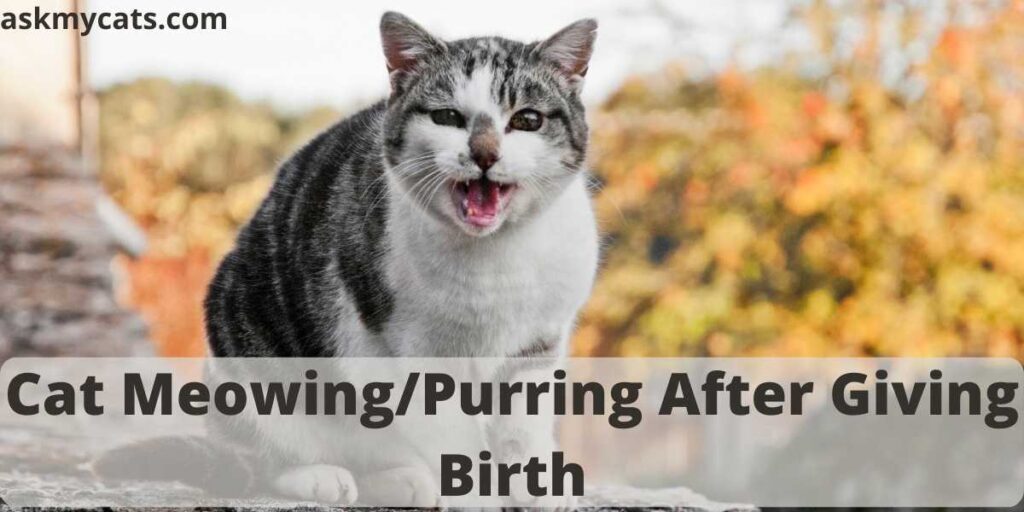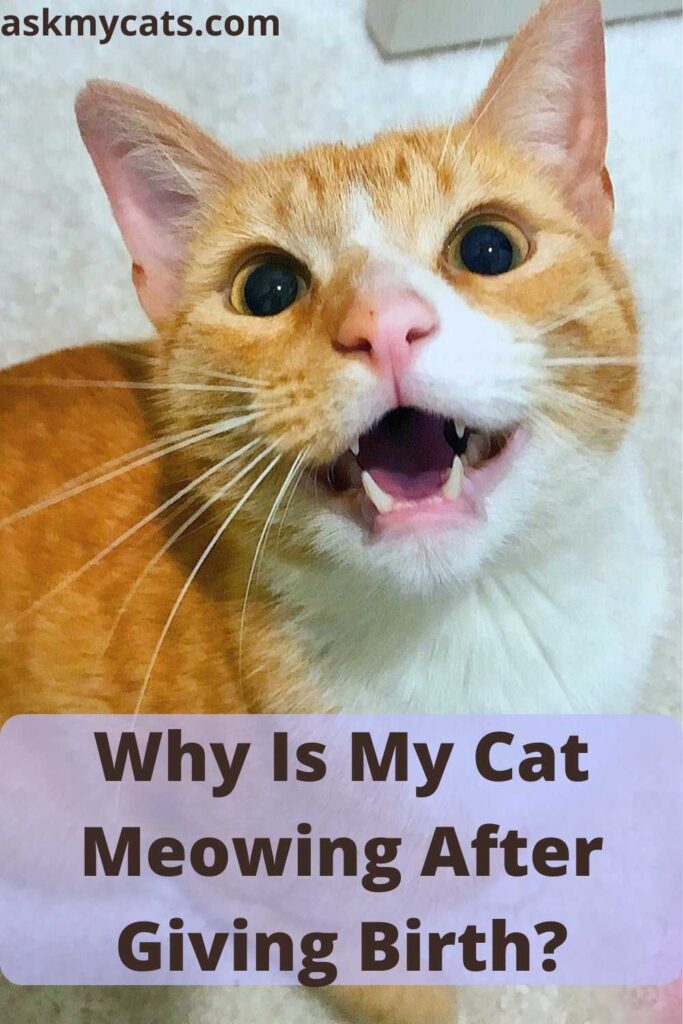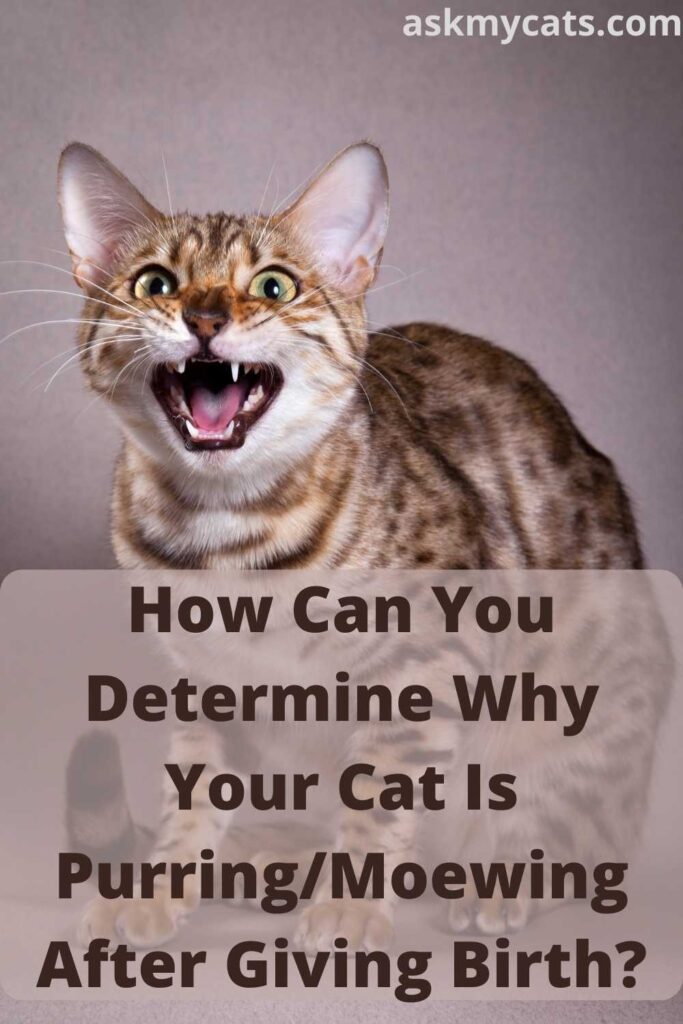Purring is a frequent vocalization made by kittens and cats, but the meaning and motive behind a cat’s purr are far more complicated than they appear.
Understanding the significance of your cat’s vocalizations might help you communicate more effectively and strengthen your bond.
So, is it normal for a cat to meow/purr after giving birth?
Yes, it is normal for a cat to meow/purr after giving birth, as she might be hungry or thirsty, or even worse, a vet must be consulted as soon as possible.
Keep reading this article, to know the reasons behind your cat meowing/purring after giving birth.


Give Your Cat the Perfect Day
Get the Free Ebook!
Why Is My Cat Meowing After Giving Birth?
Here are some reasons behind your cat meowing after giving birth: –

1. Illness
The first step is for your veterinarian to perform a thorough examination.
A variety of conditions can cause a cat to experience hunger, thirst, or pain, all of which can result in excessive meowing.
Cats can potentially get an overactive thyroid or kidney illness, which can cause excessive vocalizations.
2. Attention seeking
Cats, contrary to popular belief, dislike being alone.
Cats frequently meow to initiate play, petting, or conversation. Stop responding to attention-seeking meows if you wish to reduce them.
Only pay attention to them when they are silent. If they start meowing again, either look or move away. However, do not disregard your pet.
Spend meaningful time with them every day, playing, grooming, and talking to them. A tired pet is a more quiet pet.
3. Hunger
Some cats meow whenever someone enters the kitchen, hoping for a bite. When it comes to mealtime, many cats get extremely loud.
If this is the case, do not feed your cat when it is crying. Wait until they are calm before putting food down, and don’t offer them rewards if they meow.
If this doesn’t work, invest in an automatic feeder that opens at predetermined intervals. Kitty will now meow at the feeder rather than you.
You would also like to read: Why Do Cat’s Noses Get Wet When They Purr?
4. Loneliness
If your pet spends too many hours alone each day, consider hiring a pet sitter to improve your pet’s life.
Place a bird feeder outside a window where they can see it. Set out foraging toys with food inside.
Get them a kitty condo and rotate the toys you set out for them to play with. Many cats meow when their owners return home or even merely greet them in the house.
This is a difficult habit to break but think of it as a kitten greeting you.
5. Cat Is Stressed
When cats are stressed, they frequently become more vocal.
Giving birth, a new pet or newborn, a transfer or change in the home, illness, or the death of a loved one can all cause your cat to become a talker.
Find out what is bothering your pet and help them adjust to the change. If that isn’t possible, pay additional attention to your cat to help relax them.
You might also like to read: Do Cats Purr When Stressed?
Why Is My Cat Purring So Much After Giving Birth?
Here are some of the reasons why your cat might be purring after giving birth.

1. Because She Is Content
Cats may purr because they are warm, snug, and content, perhaps most evident while curled up on a human’s lap.
Most people understand that purring indicates that a cat is a content.
It almost always is, although cats can also purr when they are in pain or stressed, such as while visiting the vet.
Purring, when accompanied by any of the other indications and signals described here, indicates that your kitty is content.
Many individuals who own indoor cats wonder if their cat is actually content without going outside.
The indicators of a contented cat are the same indoors and out, so you’ll know what to look for.
Cats don’t need a lot of space to be content. You can even have a cat in a small apartment if you and the kitty collaborate to share space.
Cats are territorial, so your home or apartment becomes their domain, and they will claim favored locations as their own.
Good luck if your cat’s favorite spots include your beloved chair or pillow; you may lose this war against your cat’s unbreakable will.
Interesting Read: Why Does My Cat Purr When She Sees Me?
2. Cats Purr To Calm Themselves
While it is true that cats purr when they are quite relaxed, animal experts believe that cats also purr when they are really stressed or in pain, such as while seeing the vet or giving birth.
Cats purr to calm themselves down, according to scientists, which means they’re just as likely to do so in a stressful or painful scenario as they are while snuggled up in someone’s lap.
Purring’s low-frequency vibrations help them relax and breathe more easily.
Also, check out: Why Do Cats Wag Their Tails While Purring?
3. Purring Helps With Healing
Purrs do more than just soothe your cat; experts believe these vibrations can help heal injuries, repair and develop muscles, and even function as a painkiller, which may explain why injured or sick cats choose to invest important energy in purring.
It could also explain why cats recover from surgery more rapidly than dogs and have fewer complications.
4. ‘Solicitation Purrs’ Help Your Cat Ensure Their Needs Are Met
Purring can also help your cat in other ways. Scientists have discovered a sort of purring known as the solicitation purr,’ which cats appear to employ only to gain something from their owner – either attention or food.
The solicitation purr’ is a combination between a meow and a purr, with a frequency similar to that of a wailing baby – a noise to which we are naturally trained to respond.
Must Read: Why Is My Pregnant Cat Purring So Much?
How Can You Determine Why Your Cat Is Purring/Moewing After Giving Birth?
You can determine why your cat is purring after giving birth by examining them closely.

Though purring is not simply a sign of satisfaction, you should not fear the next time you hear it.
There’s a reason people equate it with happiness—still it’s the main reason your cat will rumble away.
“They may purr when they are injured or in pain, but it is more often a sign of contentment among our furry companions,” experts explain.
The easiest method to decipher your cat’s message is to observe what else is going on.
If it’s dinnertime, or if the frequency of the purring has increased, your furry buddy may be thinking about food.
Also, check out: Do Cats Purr When They Are Happy?
If your cat purrs and then bites you, she’s probably annoyed or angry.
Keep an eye out for your cat’s continual, insistent vocalizing; if it lasts for 24 to 36 hours, it could be one of the symptoms that your “healthy” cat is actually unwell.
A cat purring while curled up on your lap, on the other hand, is probably just enjoying your company.
Don’t dismiss it without first confirming that there is no problem.
Interesting Read: Pregnant Cat Keeps Meowing: Know These Reasons
Although you should avoid rewarding meowing, cats sometimes meow for good reason – they can’t reach their litter box, they’re stuck in a room, or the water bowl is empty.
When they meow, check on them to see if it’s something you can safely ignore or if there’s an issue that has to be addressed right away.
Don’t punish a meowing cat. Hitting, yelling, and spraying cats with water rarely help in the long run to silence a meowing cat, but all of these behaviors will make your cat distrust or even resent you.
Don’t submit. If your cat is accustomed to receiving what they want by meowing, they will meow more and louder when it stops working.
In other words, things are likely to grow worse before they get better. Just keep rewarding peaceful behavior and ignoring meowing, and they’ll catch on.
Interesting Read: Why Is My Cat Purring So Much?
Frequently Asked Questions
How do cats purr?
Cat owners may wonder not only why cats purr, but also how they do it. How do they make that distinct sound? Contrary to popular belief, felines do not have a distinct bodily component or voice function that permits them to purr. The sound is produced instead by quick movements in their voice box. “A purr begins as a signal from the central nervous system that travels to muscles in the voice box,” experts explain. “These muscles tighten and release very quickly as the cat inhales and exhales, creating the vibrations we can feel and hear.”
What if my cat doesn’t purr?
Each cat purrs in a unique style and at a unique volume. Some cats purr nearly completely silently, and the only way to tell is to touch their neck or throat and feel the vibration. Other cats, however, do not appear to purr at all, and experts are still attempting to figure out why barring a vocal cord lesion. Feral cats are more likely than domestic cats to be non-purrers, leading to the notion that feral cat moms suppress purring in their kittens to keep predators away.
Interesting Read: Can Cats Control Their Purring?
How to manage a cat who is suffering from metritis?
If your cat is breastfeeding and has been diagnosed with a bacterial blood infection, it is preferable to nurture her kittens by hand to avoid infection transmission through her milk. This can also protect the kittens from being exposed to the antibiotics prescribed in their mother’s circulation. Keep in mind that, even if not spayed, animals treated for uterine infections may become less productive, if not infertile, making breeding difficult or impossible in the future.
Also, check out: Do Cats Breathe Faster When Purring?
Final Words
If your cat is meowing/purring after giving birth, the safest course of action must be to take her to the vet and get her checked to rule out any medical issues.
If you have any questions, feel free to ask us in the comments section.
Fun Read: Can Humans Purr?
Also, check out: Why Do Cats Purr When They Sleep?
Must Read: Cat Purring Effect On Humans: The Power of Cat Purring
